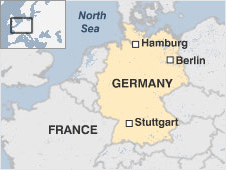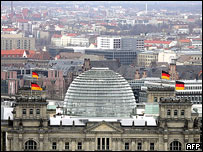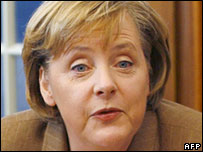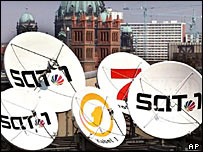 |
Located in the heart of Western Europe Germany is the continent's most industrialized and populous country. Famed for its technological achievements it has also produced some of Europe's most celebrated composers philosophers and poets.
Achieving national unity later than other European nations Germany quickly caught up economically and militarily before defeats in World War I and II left the country shattered facing the difficult legacy of Nazism and divided between Europe's Cold War blocs.
Germany rebounded to become the continent's economic giant and a prime mover of European cooperation. With the end of the Cold War the two parts of the country were once again united but at an economic price that is still being felt.
Overview
People in the previously affluent west have had to pay a higher price than many originally expected while those in what was once the German Democratic Republic the former Soviet-dominated east saw jobs vanish and the cost of living spiral. The population is declining there too as young people vote with their feet.

Dome of the Reichstag rises over Germany's resurgent capital Berlin
|
The pain of Germany's Nazi-era history remains a sensitive element in the country's collective modern-day psyche. Out of the devastation of World War II grew European awareness of the need to guard against any such catastrophe recurring on the continent.
In the 1950s Germany was one of the six founding nations in the original European Economic Community from which the European Union was eventually to develop and in which Germany is a key player. Franco-German cooperation was central to European economic integration in the 1980s and 90s.
Germany's international profile has been growing in other areas too. The country sent peacekeepers to the Balkans and its forces have been involved in operations in Afghanistan. The former chancellor Gerhard Schroeder was a vociferous critic of the launch of US-led operations in Iraq.
The country has famous beer brewing traditions. Beer purity laws dating back to 1516 limit the fermentation ingredients to malted grain hops yeast and water.
As the birthplace of Johann Sebastian Bach Ludwig van Beethoven and Johannes Brahms among others Germany's gift to European classical music is colossal while Goethe Nietzsche Kant and Brecht are giants in the world of letters and philosophy.
Facts
- Full name: Federal Republic of Germany
- Population: 82.2 million (UN 2009)
- Capital: Berlin
- Area: 357027 sq km (137849 sq miles)
- Major language: German
- Major religion: Christianity
- Life expectancy: 77 years (men) 82 years (women) (UN)
- Monetary unit: 1 euro = 100 cents
- Main exports: Motor vehicles electrical machinery metals
- GNI per capita: US $42440 (World Bank 2008)
- Internet domain: .de
- International dialling code: +49
Leaders
President: Horst Koehler
The president has a mainly ceremonial role. Horst Koehler a former head of the International Monetary Fund (IMF) was elected in May 2004 and re-elected for another five-year term in May 2009.
Chancellor: Angela Merkel
Angela Merkel Germany's first female chancellor swept back to power in general elections in September 2009.
 Angela Merkel has won praise for her steady leadership
|
Mrs Merkel leader of the conservative Christian Democrats (CDU) first took office in 2005 when general elections produced a very close result. She became chancellor in a "grand coalition" involving the CDU its Christian Social (CSU) allies and the Social Democratic Party (SPD).
In 2009 her party secured another four-year mandate with enough votes to dump the previous awkward coalition with the Social Democrats in favour of an alliance with the pro-business Free Democrats (FDP).
After more than three weeks of hard bargaining the CDU and FDP sealed a coalition deal when they finally reached agreement on a tax cuts package.
The coalition faces some tough challenges. Germany's export-dependent economy was hit hard by the global financial crisis of 2008-9 which triggered the worst recession since the foundation of the post-war Federal Republic in 1949.
The recession has left Germany's public finances in tatters making it hard to honour pre-election promises to slash taxes and the exact figure to be cut proved to be the thorniest issue in the coalition talks.
On issues such as healthcare nuclear power and foreign policy the CDU and FDP - who have a long history of being in coalition - found it much easier to reach agreement.
During her first term in office Mrs Merkel steered a centrist course at home and earned a reputation as a talented mediator at the international level.
She was born in Hamburg in 1954 but grew up in East Germany where her father was a Protestant clergyman. She holds a doctorate in physics.
She became leader of the CDU in 2000 after Helmut Kohl was brought down by a party funding scandal.
In 2009 Mrs Merkel topped Forbes magazine's list of the world's 100 most powerful women for the fourth year in a row. The magazine said that she had won respect for her cool leadership and cited her achievement in getting G8 leaders to agree to goals for cutting greenhouse gas emissions and in persuading European Union leaders to move forward from the failure to secure a constitution.
The global financial crisis of 2008-9 posed an even tougher challenge. Germany experienced its worst slump in output for more than 60 years but Mrs Merkel's calm handling of the crisis won her respect both at home and abroad.
She divorced her first husband Ulrich Merkel in 1982 and has been married to publicity-shy chemistry professor Joachim Sauer since 1998. She has no children. She is a fan of classical music regularly attending the annual Bayreuth opera festival and enjoys hiking in the Alps in her free time.
Media
Germany's competitive television market is the largest in Europe with some 34 million TV households.

Major TV networks use cable and satellite to reach viewers
|
The many regional and national public broadcasters - organised in line with the federal political structure - vie for audiences with powerful commercial operators. Each of the country's 16 regions regulates its own private and public broadcasting.
Around 90% of German households have cable or satellite TV and viewers enjoy a comprehensive mix of free-to-view public and commercial channels. This has acted as a brake on the development of pay-TV services.
Germany is home to some of the world's largest media conglomerates including Bertelsmann and the publisher Axel Springer. Some of Germany's top free-to-air commercial TV networks are owned by ProSiebenSat1 a consortium led by a US billionnaire.
Germany is rolling out digital radio and TV and aims to switch off its analogue TV transmitters by 2010. Public TV broadcasters ZDF and ARD offer a range of digital-only channels.
While the press and broadcasters are free and independent the display of swastikas and statements endorsing Nazism are illegal.
There are several national newspapers but the press market is strongest at a regional level with more than 300 titles.
The press
- Frankfurter Allgemeine Zeitung - prestigious daily
- Sueddeutsche Zeitung - Munich-based daily
- Die Welt - Berlin-based daily
- Frankfurter Rundschau - Frankfurt am Main-based daily
- Handelsblatt - Duesseldorf-based financial daily
- Financial Times Deutschland - Hamburg-based financial daily
- Focus - weekly news magazine
- Der Spiegel - news weekly English-language site
- Die Zeit - weekly
- Bild - mass-circulation daily
- The Local - Berlin-based English-language
Television
- ARD - organisation of regional public broadcasters; operates Das Erste the main national public TV channel
- ZDF - operates second national public TV channel
- n-tv - commercial rolling-news
- N24 - commercial rolling news
- RTL - major commercial broadcaster operates entertainment channels
- Deutsche Welle TV - Germany's international TV service in German English Spanish
- Sky - pay-TV operator
Radio
- ARD - umbrella organisation of public radio services including those of individual regions
- Deutschlandradio - operates national public stations Deutschlandfunk and Deutschlandradio Kultur both offering current affairs and cultural programmes
- Deutsche Welle - international radio broadcaster services in many languages
News agency
-
Deutsche Presse-Agentur (dpa)
AFRICA | ASIA-PACIFIC | AMERICAS | EUROPE | MIDDLEEAST | SOUTHASIA
Mauritania Mauritius Morocco Mozambique Namibia Niger Nigeria Republic-of-congo Rwanda Sao-tome-and-principe Senegal Seychelles Sierra-leone Somalia South-africa Sudan Swaziland Tanzania The-gambia Togo Tunisia Uganda zambia Zimbabwe Australia Brunei Burma Cambodia China East-timor Fiji Indonesia Japan Kazakhstan Kiribati Kyrgyzstan Laos Malaysia Marshall-islands Micronesia Mongolia Nauru New-zealand North-korea Palau Papua-new-guinea Samoa Singapore Solomon-islands South-korea Taiwan Tajikistan Thailand The-philippines Tonga Turkmenistan Tuvalu Uzbekistan Vanuatu Vietnam Antigua-and-barbuda Argentina Bahamas Barbados Belize Bolivia Brazil Canada Chile Colombia Costa-rica Cuba Dominica Dominican-republic Ecuador El-salvador Grenada Guatemala GuyanaHaiti Honduras Jamaica Mexico Nicaragua Panama Paraguay Peru St-kitts-and-nevis St-lucia St-vincent-and-the-grenadines Suriname Trinidad-and-tobago United-states-of-america Uruguay Venezuela Albania Andorra Armenia Austria Azerbaijan Belarus Belgium Bosnia-hercegovina Bulgaria Croatia Cyprus Czech-republic Denmark Estonia Finland France Georgia Germany Greece Hungary Iceland Ireland Italy Latvia Liechtenstein Lithuania Luxembourg Macedonia Malta Moldova Monaco Montenegro Norway Poland Portugal Russia San-marino Serbia Slovakia Slovenia Spain Sweden Switzerland The-netherlands Turkey Ukraine United-kingdom Vatican Algeria Egypt Iran Iraq Israel-and-palestinian-territories Jordan Kuwait Lebanon Libya Mauritania Oman Saudi-arabia Sudan Syria Tunisia United-arab-emirates Yemen Afghanistan Bangladesh Bhutan India Nepal Pakistan Sri-Lanka The-Maldives

